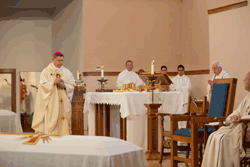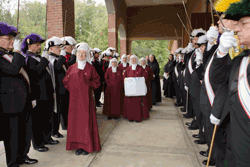The deceased Handmaids of the Precious Blood will now rest at Christ Prince of Peace Retreat Center

REMEMBERING THOSE WHO CAME BEFORE Bishop Richard F. Stika presides at the funeral Mass for the Handmaids of the Precious Blood on Sept. 21 at St. Mary Church in Athens. Photo by Stephanie Richer
The Handmaids of the Precious Blood, who are making their way across country from New Mexico to their new home at the Christ Prince of Peace Retreat Center in Benton, are not alone on their journey.
They are being accompanied by nuns from the order who preceded them and have passed away. The Handmaids were not leaving their sisters who have died behind. Now, the deceased nuns will rest on the grounds of the retreat center, in the shadows of their sisters who are continuing on.
Bishop Richard F. Stika has taken an active role in relocating all the nuns to East Tennessee and led a funeral Mass for them Sept. 21.
“There is an old Irish proverb – the Irish always like it when it rains on the day of a funeral, because it’s like the angels are crying,” Bishop Stika told those who braved a steady rain to honor Mother David Marie of Our Mother of Sorrows, a former prioress of the Handmaids of the Precious Blood, at her funeral Mass that he celebrated.
The Bishop drew smiles when he added, “Well, the community that we celebrate with today must have such good friends in Heaven because I think every angel in heaven is crying.”
The laughter was not inappropriate because joy marked the services at St. Mary Church in Athens. Three white caskets rested in the church sanctuary—one containing the remains of the first Handmaid, Sister Elizabeth of the Trinity; one with Mother David Marie; and the third with the ashes of 39 other Handmaids.
About two dozen members of the Knights of Columbus from several local parishes provided an honor guard for the caskets and also kept watch at the entrances to the sanctuary so that the Handmaids could conduct a private prayer service for themselves before the public viewing and funeral.
A number of people came to pay their respects, including sisters from other religious orders in the diocese.
To bring the Handmaids from New Mexico to Tennessee was not easy.

Knights of Columbus provide an honor guard at the funeral Mass. Pictured are Handmaids of the Precious Blood (from left) Rev. Mother Marietta, Sister Rose Philomena, Sister Marie Joséph, Sister Anunziata, and Sister Mary Genevieve. Also pictured are Sister Mary Christine Cremin, RSM, and Sister Sean Marie Striby, RSM. Photo by Stephanie Richer
The present prioress of the Handmaids, Mother Marietta, explained that the amount of paperwork to move the remains was “tremendous.”
“We had to produce death certificates for each person to get the permits to move them across state lines,” she said. “In one case, the records did not have a sister’s former name, before she took her vows, and all of that had to be verified.”
Fortunately for the Handmaids, help came from Bridges Funeral Home in Knoxville. A member of its staff, Martin Bartling, who is a parishioner at Holy Ghost Church, was contacted by the Diocese of Knoxville Chancery.
“We met with the diocese and agreed to assist with everything,” said Dennis Bridges, owner of the funeral home. “We were amazed at the whole story of the sisters and their relocation here and becoming part of the Knoxville Diocese, and not wanting to leave their sisters behind. We are honored to provide this service to the diocese.”
But the logistics of moving all of the Handmaids still were daunting. The body of Sister Elizabeth was flown to Knoxville, and Bridges Funeral Home arranged for the transport of Mother David Marie from Illinois, where she had been in a hospice operated by the Little Sisters of the Poor.
However, the question remained how to get the ashes of the other Handmaids to Tennessee. Remains of six of the deceased sisters were transported via the U.S. Postal Service.
Although tracking of the remains was lost for four of them, the ashes were safely delivered. But it raised serious concerns as to how the remaining sisters would make the trip.
“There was a lot of discussion,” said Mother Marietta. “Bridges said they would handle it, then Paul Simoneau said he would drive out to New Mexico and bring them back. And suddenly the bishop announced that during his holy hour before the Eucharist, he felt God wanted him to make the trip and bring them home.”
Mr. Simoneau is vice chancellor of the diocese and director of its Office of Justice and Peace.
“It was a sort of mini retreat,” Bishop Stika said. “And I wanted to see their monastery anyway.”
Two weeks before the Eucharistic Congress Sept. 13-14, the bishop flew alone to New Mexico. Once there, he rented a large SUV and packed 33 boxes into the back of it, each containing the cremated remains of a deceased sister.
In his homily during the funeral, Bishop Stika said as he drove he felt that behind his seat was “a sense of holiness, a sense of prayerfulness.”
He related how he used his time—four days on the road along Interstate 40—to watch the landscape and weather change, to listen to CDs with talks by Bishop Fulton J. Sheen and Gregorian chant, to pray, and keep a sort of running conversation with his 33 passengers, “especially Sister Augustine.”
“She sat right behind the driver’s seat,” he said.
Mother Marietta laughed as she recalled that every night the bishop would call her to let her know “the girls were OK and having a good time.”
“I even took them for their first trip through the drive-thru at a White Castle,” he said smiling.
At the funeral, Bishop Stika reminded those in attendance that we should feel “gratitude to God for those in the religious life … for the gift of prayer that they give to us.”
“Prayer is not just the Our Father, or the Hail Mary, or the great act of prayer of the Eucharist. Prayer is giving oneself to a greater purpose. For those who are people of faith, it is the purpose of God Himself.”
After the funeral, a procession traveled from St. Mary Church to the diocesan retreat center in Benton, where a special area has been designated at the center for the Handmaids of the Precious Blood to bury their dead.
There are plans to eventually build a formal monastery for the Handmaids next to the cemetery.
